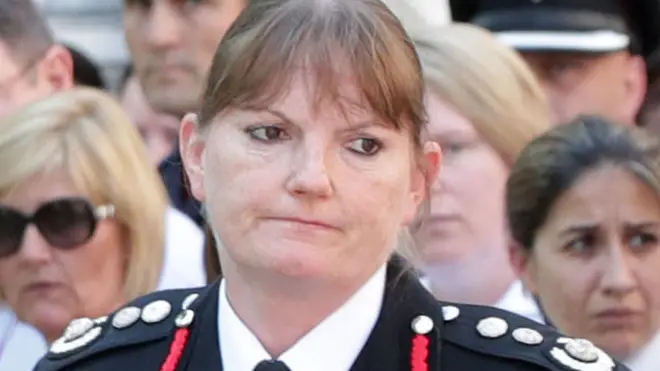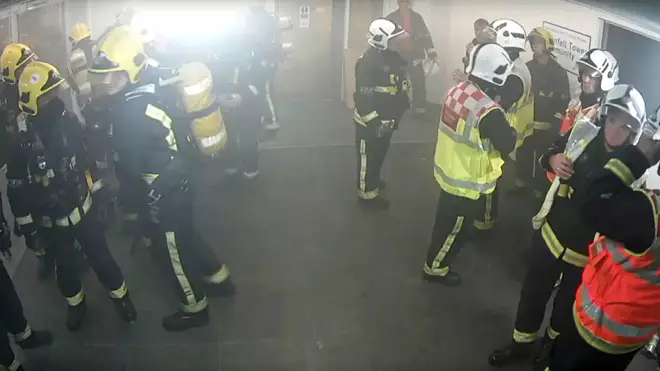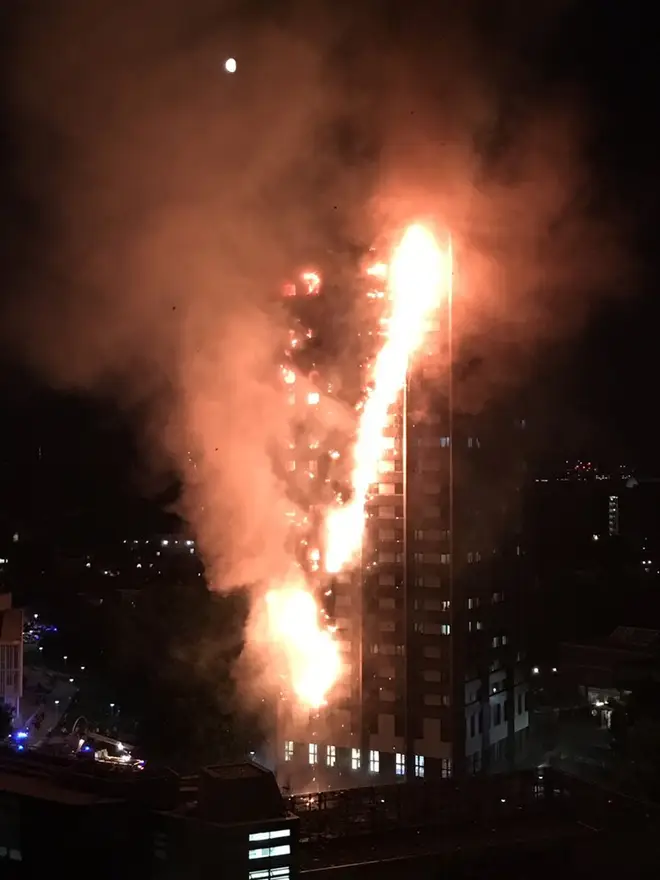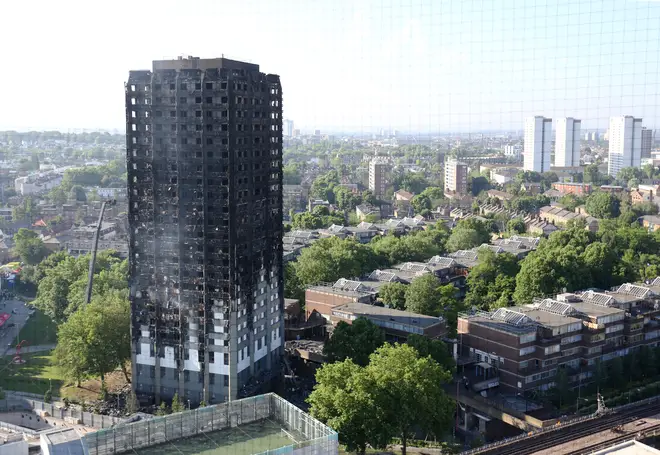
Tom Swarbrick 4pm - 7pm
30 October 2019, 10:17

The head of the London Fire Brigade said she will not resign from the role despite facing criticism in the first report into the Grenfell Tower blaze.
London Fire chief Dany Cotton issued a statement today after the first phase of the full report into the Grenfell Tower fire was published.
She expressed her "sorrow" for not being able to save victims of the Grenfell Tower fire and apologised for her comments in which she said she "wouldn't change anything."
Speaking to LBC reporter Rachael Venables, Ms Cotton explained that the responsibility for the night lies with her.
The report, by chairman Sir Martin Moore-Bick, has identified 46 changes that should be made to ensure the safety of people living in high rise blocks.
Ms Cotton said today: “On behalf of London Fire Brigade I want to express our deepest sorrow at not being able to save all those who died in the Grenfell Tower fire. The suffering of the bereaved, survivors and community will never be forgotten by any of us in the Brigade.
She said the fire was “precipitated by significant failings of the building’s fire safety measures which created impossible conditions that residents and the emergency services must never be placed in again.
“We have made, and will continue to review and make changes to our policies, our training and our equipment. We are lobbying for major building regulation change and urgent research into ‘buildings that fail’ on fire safety, which leaves the national ‘stay put’ strategy no longer viable. We will never give up until all of the changes we are calling for to protect residents have been made.
“We have and will continue to fully assist the Grenfell Tower Inquiry to understand what happened in order to learn and prevent such a tragedy ever happening again.”

The report also cleared the man who lived in the flat where the fire started of any blame.
Sir Martin said the resident, who lived in flat 16, bore no blame for the fire, which he found started in a faulty fridge-freezer in his home.
"I consider the cause and origin of the fire and find that it was started by an electrical fault in a large fridge-freezer in the kitchen of Flat 16, for which Behailu Kebede bears no blame," Sir Martin wrote.
"Whatever the origin of the initial fire, the evidence indicates that it was accidental. Mr Kebede in particular bears no blame for what occurred in his flat, much less for the catastrophic events that followed.
"On the contrary, he did exactly what a responsible person might be expected to do in the circumstances and his presence of mind in switching off the electricity as he left the flat enabled important evidence to be gathered about the origin of the fire."
Grenfell United, a group which represents some of the victims of the fire, welcomed the findings.
A spokeswoman said: "We are glad to read this report totally exonerates our neighbour in flat 16. The Whirlpool fridge started the fire and our neighbour did everything he could do try to stop it and raise the alarm. He is long overdue an apology from media and corporates that tried to scapegoat him."
Responding to the report, London Mayor Sadiq Khan commended the emergency services for their "courage and bravery" but added there were "lessons to learn for London Fire Brigade."
"While institutional failures meant that the overall response to the disaster was not good enough, every single person who attended that night did so to save lives," he said.
"I personally will do everything within my power to ensure that the Inquiry’s recommendations are implemented."

Liberal Democrat candidate for Kensington Sam Gyimah MP criticised the government's cuts to the fire service and a "systemic lack of accountability within current building regulations."
"It is time the Conservative government acted so that a tragedy such as Grenfell never happens again," he said.
A statement released by Metropolitan Police Commander Stuart Cundy called the report "a milestone" which will be "difficult reading for many" but will "remember all those so deeply affected by the tragedy."
Speaking on Tuesday prior to the report's release, prime minister Boris Johnson said the victims and those affected were owed the truth and his commitment to "airing" the facts "in public" would remain "absolute."

Evacuation:
- the government must develop national guidelines for carrying out partial or total evacuations of high-rise residential buildings, which include procedures for evacuating people who are unable to use the stairs in an emergency, or who may require assistance (eg disabled people, older people and young children)
- fire and rescue services must develop policies and training for partial and total evacuation of high-rise residential buildings
- all current and future high-rise residential buildings must be equipped with sounders or similar devices enabling fire services to send an evacuation signal to the whole or a selected part of the building
- all fire and rescue services must be equipped with smoke hoods for evacuation through smoke-filled exit routes
The owner and manager of every high-rise residential building must:
- draw up and regularly review evacuation plans, provide copies in electronic and paper form to their local fire service and place in an information box on the premises
- prepare personal emergency evacuation plans (PEEPs) for all residents whose ability to self-evacuate may be compromised and keep these in the information box
- the owner and manager of every residential building containing separate dwellings must provide fire safety and evacuation instructions in a form that the occupants of the building can reasonably be expected to understand
Emergency calls:
- The LFB's policies must be amended to draw a clearer distinction between callers seeking advice and callers who believe they are trapped and need rescuing
- all fire and rescue services must develop policies for handling a large number of fire survival guidance (FSG) calls simultaneously
- electronic systems must be developed to record FSG information in the control room and display it simultaneously in units at the fire
- policies must be developed for managing a transition from "stay put" to "get out"
- control room staff must receive training on handling such a change of advice and conveying it effectively to callers
Fire doors:
- the owner and manager of every residential building containing separate dwellings must carry out an urgent inspection of all fire doors
- they must carry out checks no less than every three months to ensure that all fire doors are fitted with effective self-closing devices in working order
- all those who have responsibility for the condition of the entrance doors to individual flats in high-rise residential buildings with unsafe cladding must ensure that they comply with current standards
Floor numbers:
- floor numbers must be clearly marked on each landing within the stairways and prominently in all lobbies so they are visible both in normal conditions, low lighting and smoke
Plans and inspections:
The owner and manager of every high-rise residential building must:
- provide their local fire service with information about the design and materials of its external walls and inform them of any material changes
- provide their fire service with up-to-date paper and electronic floor plans, showing key fire safety systems
- regularly inspect lifts intended to be used by firefighters in an emergency, test the mechanism which allows firefighters to take control of them and report the results to the fire service every month
All fire and rescue services must:
- ensure that all officers of the rank of crew manager and above are trained and aware of the requirements expected during inspections of high-rise buildings
- be equipped to receive and store electronic plans and to make them available to incident commanders and control room managers
- ensure that all staff understand the risk of fire taking hold in the external walls and know how to recognise this
Communication:
- all officers who may be expected to act as incident commanders must receive training on communication with the control room
- all control room operators of assistant operations manager rank and above must receive training on communication with the incident commander
- a dedicated communication link must be provided between the senior officer in the control room and the incident commander
Command and control:
- the LFB must develop policies and training to ensure better control of deployments and the use of resources
- the LFB must develop policies and training to ensure that better information is obtained from crews returning from deployments and that it can be made available immediately to the incident commander
- the LFB must develop a communication system to enable direct communication between the control room and the incident commander and improve the means of communication between the incident commander and the bridgehead
- the LFB must investigate the use of modern communication techniques to provide a direct line of communication between the control room and the bridgehead
Equipment:
- the LFB must urgently take steps to obtain equipment that enables firefighters wearing helmets and breathing apparatus to communicate with the bridgehead effectively
- the LFB must urgently take steps to ensure that the command support system is fully operative on all command units and that crews are trained in its use
Emergency services:
- each emergency service must communicate the declaration of a major incident to each other as soon as possible
- clear lines of communication must be established as soon as possible between the control rooms of the individual emergency services
- steps must be taken to investigate the compatibility of the emergency services' systems with a view to enabling them to read each others' messages
- Emergency services and local authorities must investigate ways of improving the collection of information about survivors and making it available more rapidly to those wishing to make contact with them
Sir Martin did not make recommendations in certain areas, instead saying they fall under the remit of the inquiry's second phase
These are:
- whether the regulations relating to high-rise buildings in England and Wales should be changed to apply to buildings lower than 18 metres
- whether the use of combustible materials on the outside of high-rises should be banned
- the testing and certification of materials
- the installation of sprinklers
Scotland Yard’s criminal investigation into the fire is ongoing. The Metropolitan Police had previously ruled out making a decision on bringing any criminal charges until the end of the public inquiry.
The Met said in a statement today: “The Met’s criminal investigation into the fire began immediately following the tragedy. It remains a hugely complex and detailed investigation and at any one time we have 160-180 dedicated police officers and staff working on it.”
The Met said it had adopted recommendations in the report for the handling of major fire incidents including enhanced training for senior officers, and a new rota of inspectors available 24 hours a day who are specifically trained in co-ordinating the casualty response to a major incident in terms of liaising with hospitals and setting up survivor reception centres.
“On behalf of London Fire Brigade I want to express our deepest sorrow at not being able to save all those who died in the Grenfell Tower fire. The suffering of the bereaved, survivors and community will never be forgotten by any of us in the Brigade.
“The Inquiry’s report details from the start that fire spread to the top of the building within 20 minutes. It was an unprecedented residential building fire, precipitated by significant failings of the building’s fire safety measures which created impossible conditions that residents and the emergency services must never be placed in again.
“We will now carefully and fully consider all of Sir Martin Moore-Bick’s Phase 1 report and take every action we can to improve public safety. Many of the recommendations are welcome and will need to be fully understood not only by London Fire Brigade, but by government, every fire and rescue service and every residential building owner and manager across the country.
“The report is focused on our response and it is right for our actions to be fully examined by the Inquiry. We welcome the Chairman’s recognition of the courage, commitment and bravery of firefighters on the night, but we are disappointed at some of the criticism of individual staff members who were placed in completely unprecedented circumstances and faced the most unimaginable conditions while trying to save the lives of others. On the evacuation of Grenfell Tower we note the Chairman states* he has received no expert evidence to guide him on reaching his conclusion and that a qualitative judgement on the Brigade’s approach might be better reserved for Phase 2.
“We are also disappointed that measures we have been calling for are not in the recommendations, including the wider use of sprinklers in both new and existing buildings.
“We have made, and will continue to review and make changes to our policies, our training and our equipment. We are lobbying for major building regulation change and urgent research into ‘buildings that fail’ on fire safety, which leaves the national ‘stay put’ strategy no longer viable. We will never give up until all of the changes we are calling for to protect residents have been made.
“We have and will continue to fully assist the Grenfell Tower Inquiry to understand what happened in order to learn and prevent such a tragedy ever happening again.”